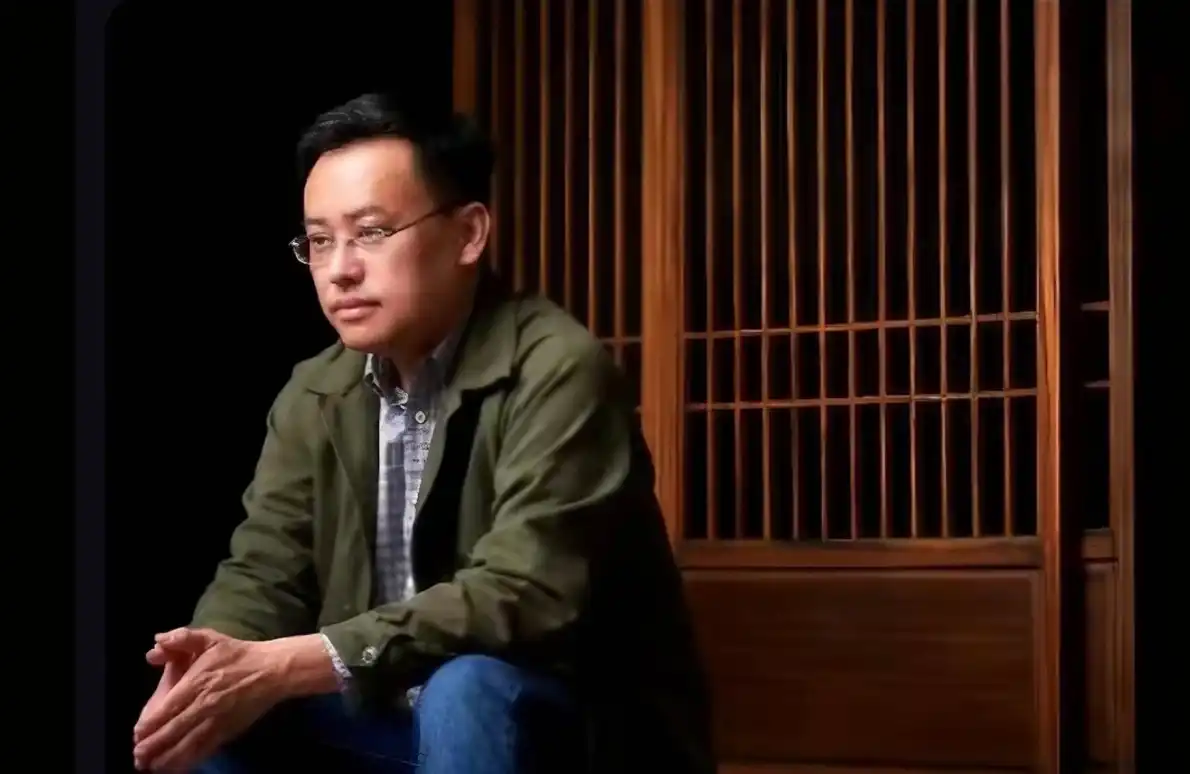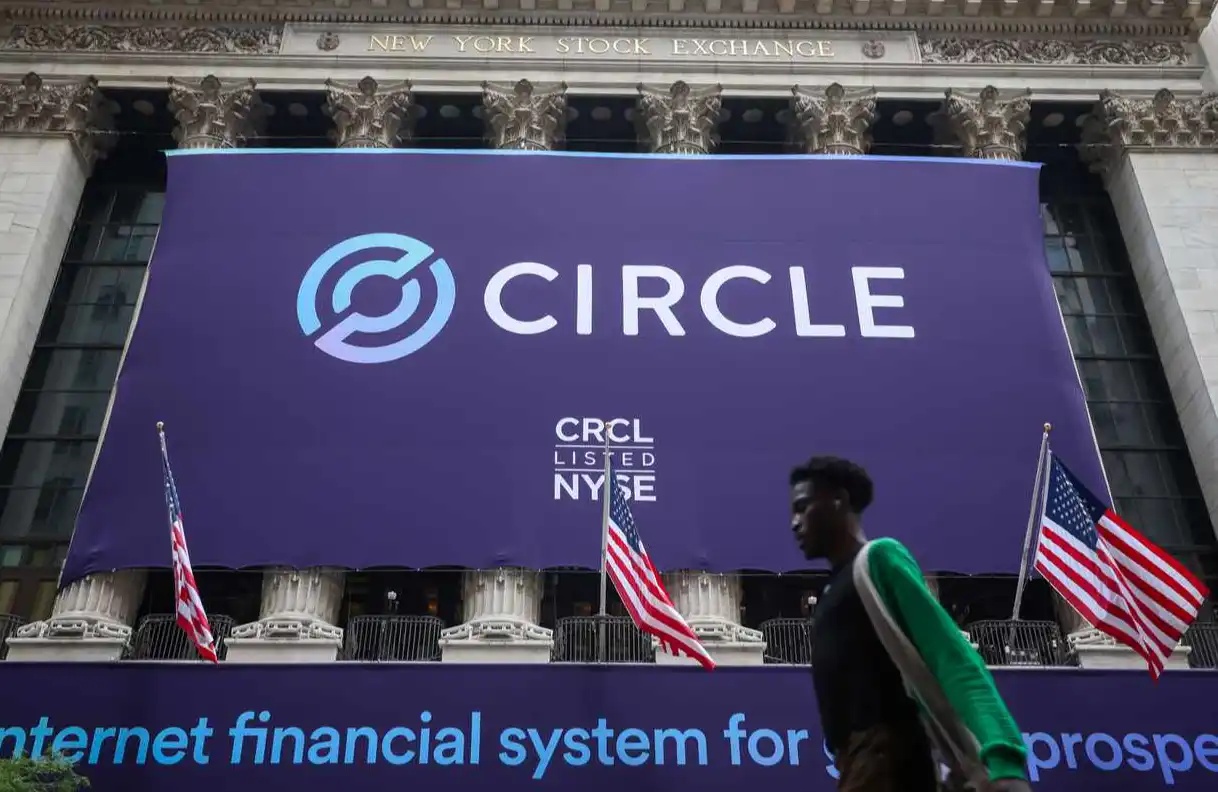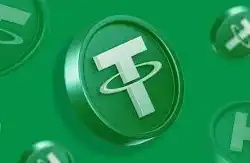Pomp Investor, Binance Advocate, Bitcoin Evangelist — The Multifaceted Role of Investor Matic馈
Original Title: "Maigang: He Changed Pop Mart and Bitcoin"
Original Source: Deep Tide TechFlow
Labubu has taken the world by storm, and Pop Mart's HK$340 billion market value has made its founder Wang Ning the richest man in Henan.
An anecdote that has been mentioned again and again: before Pop Mart went public, investors' evaluation of Wang Ning was: average education, no serious work experience, a calm demeanor when speaking, lacks charisma, and the team does not have any elites. After Pop Mart went public, investors' evaluation of Wang Ning became: Wang Ning is steady in character, speaks little, remains calm regardless of the situation, and possesses many excellent qualities of a "consumer entrepreneur."
Receiving similar treatment is Pop Mart's angel investor—Maigang. Before this trendsetting giant rose, Maigang jokingly referred to himself as an "alternative investor" who had been "kicked out of mainstream investment circles"; however, as Pop Mart's market value soared, he was invited to the "pantheon," transforming into a legendary figure in the investment world.
However, Maigang's legend extends far beyond the realm of trendy toys. Little known is the fact that Xu Mingxing, the founder of the top global crypto exchange OKX, was also an investor in Pop Mart, reaping returns of thousands of times, all thanks to Maigang. Maigang also served as a mentor to Xu Mingxing, co-founded his earliest entrepreneurial project DouDing Net, and later co-founded OKCoin.
Moreover, Maigang was also the crypto mentor of Binance co-founder He Yi. In 2014, at a private gathering organized by Maigang, he introduced He Yi, who was then a TV host, to Xu Mingxing, leading to He Yi joining OKCoin. Subsequently, He Yi introduced Binance's current founder, Zhao Changpeng (CZ), to the team, thereby initiating the global crypto exchange platform rivalry. His investment portfolio spans two seemingly unrelated fields, yet in each race, he has nurtured industry-shaping giants. It can be said that Maigang not only contributed to Pop Mart's success but also to some extent changed Bitcoin.
Early Bitcoin Evangelist
"In 2013, I was kicked out of two mainstream VC WeChat groups for discussing Bitcoin. The group members were all highly educated individuals, and I believed that my teaching approach was very professional. However, some people still thought I was selling something. At that time, I felt very lost internally because, as social animals, everyone seeks validation."
This was the first time I felt like I was "abandoned" by the VC circle, and it also made me realize for the first time that there are mainstream and non-mainstream circles, as well as individual cognitive differences," said Maigang in an interview with "Home Office New Wisdom Point" in 2021. In 2025, this article titled "Maigang: The Years I Was 'Abandoned' by the VC Circle" once again went viral on social media.
At this moment, PPTMart's market value has exceeded HKD 340 billion, a more than 20,000-fold increase from Maigang's angel investment valuation (RMB 10 million). At this moment, the price of Bitcoin has surpassed $100,000, a more than 5,000-fold increase from the price of $20 at the beginning of 2013. Maigang has never shied away from his identity as a pioneer in the Chinese investment community who was earliest to invest in and vigorously promote Bitcoin knowledge.
In 2013, when most people were unaware of or still considered Bitcoin a financial bubble, he spared no effort to promote Bitcoin knowledge and his own understanding nationwide. Cryptocurrency industry OG Shentu Qingchun recalled that he met the famous angel investor Maigang in July 2013 and inadvertently discussed Bitcoin.
"Maigang studied finance, and his views on Bitcoin were very insightful and ahead of their time, such as the national reserve currency, which Maigang mentioned at the time, has now become a reality. I have to say, Maigang is a very powerful advocate for Bitcoin. He greatly reinforced my idea of working in Bitcoin. He said he invested in OKCoin and even introduced me to celebrities. I immediately withdrew all my funds from the stock market, purchased 800 Bitcoins from OKCoin at the price of $90 each."
In Maigang's view, Bitcoin can be explained in two sentences: "First, Bitcoin is the perfect currency attributes simulated by mathematicians, geeks, and network specialists using a distributed algorithm; Second, these attributes are maintained by the unmatched computing power of a distributed computer."
He divided the monetary form of human society into three types: the first being the currency system represented by precious metal gold, the second being the credit currency supported by government credit. The emergence of Bitcoin has brought humanity into the third era of currency. He emphasized that these three forms of currency will coexist for a long time, just as the Internet did not completely replace fax machines and telephones.
Regarding Bitcoin, Maigang made a prophecy in 2014: "Bitcoin will become a tool in the game of great powers."
"I am not an anarchist, nor am I advocating for us to use Bitcoin today and abandon the Renminbi. But I can tell you, in the short term of 10 years or long term of 30 years, the United States will rebuild a global monetary system, and in this global monetary system, the United States will likely peg the dollar to a new series of assets, including virtual currencies represented by Bitcoin. Before achieving this, the only thing the United States needs to do is gain a voice in the field of Bitcoin, which could be in terms of computing power, reserves, or pricing power. Why does the United States have an advantage in doing this? Because the United States has Wall Street, which is the elite of the global elite."
Such expression may now seem familiar, but please note that this statement was made in Maing's 2014 speech, where he actively promoted Bitcoin, hoping that Chinese entrepreneurs, Chinese companies, and ordinary Chinese people could have a say in the Bitcoin field.
“I hope that everyone, including government agencies, should realize the greatness and complexity of this Bitcoin game, which truly concerns our future generations. In the last century, Americans used the dominance of the dollar to obtain the right to mint the dollar, making the whole world work for them. If Americans gain the discourse power of Bitcoin again in the next few decades, they will continue to make the whole world work for them.”
Perhaps it was also based on this understanding that Maing chose to invest and incubate OKCoin at the beginning of its establishment in 2013. Xu Mingxing had known Maing as early as 2011 when Xu Mingxing was the CTO of Douban Network, and Maing was an angel investor in Douban Network. Maing and his partner, Tim Draper, the founder of American DFJ, jointly invested 5 million RMB in Xu Mingxing. Tim Draper is a well-known American investor who previously invested in Baidu, Tesla, and others.
During the 2014 Chinese New Year, Maing approached He Yi, who was still a TV host at the time, and asked her to post OKCoin's Bitcoin red envelopes on her social circle. He Yi readily agreed. From then on, the wheel of fate began to turn, not only opening the door to the Bitcoin world for He Yi but also changing the history of the crypto world.

After the Chinese New Year, Maing organized a "thank you gathering" with OKCoin's founder Xu Mingxing, inviting everyone who helped distribute red envelopes to attend. This is how He Yi and Xu Mingxing met. Coming from a technical background, Xu Mingxing was skilled in marketing, and He Yi excelled in marketing strategies. During the gathering, Maing suddenly said, “Hey, Mingxing, isn't your company looking for a marketer? Isn't this a perfect fit?”
In the second week after the event, He Yi joined OKCoin as a vice president, responsible for brand building and marketing. Leveraging her past TV media resources, she joined the "Only You Are Unrivaled" BOSS team to promote OKCoin and even planned OKCoin's trading platform debut in New York Times Square. The common practice of recruiting KOLs for promotion nowadays was also a marketing method He Yi frequently used a decade ago.

Furthermore, He Yi also brought Zhao Changpeng, who previously worked at the Tokyo Stock Exchange, to OKCoin as the CTO. Maing's seemingly casual introductions and connections ultimately reshaped the entire competitive landscape of cryptocurrency exchanges. After Zhao Changpeng left OKCoin to establish Binance, He Yi also joined later, working together to develop Binance into the world's largest cryptocurrency exchange, while OKCoin has become the leading global exchange platform, OKX.
First Investor of Pop Mart
In June 2020, during the first half year before Pop Mart's listing on the Hong Kong Stock Exchange, Ma Gang wrote a post on the Entrepreneurial Factory official account titled "The Story of Pop Mart: From 10 Million to 100 Billion," where 10 million was the valuation when Ma Gang made an angel investment in Pop Mart and 100 billion was Ma Gang's expectation for Pop Mart at that time.
"One hundred billion is not only a number but also a goal. I believe that under Wang Ning's leadership, the Pop Mart team has the opportunity to challenge this goal and become an international company." As a result, on the day Pop Mart went public, it surpassed a market value of a hundred billion. Now, after being listed for 5 years, Pop Mart's market value has exceeded 300 billion, firmly establishing itself as one of the star companies in the Hong Kong stock market.
Looking back to 2012, Pop Mart was just a small company living in a simple residence in Beijing. In May of that year, founder Wang Ning sent an email to Ma Gang, which lay quietly in the recipient's inbox for three months before being discovered. This serendipitous discovery set the stage for a valuable investment relationship.
In August 2012, 25-year-old Wang Ning met Ma Gang for the first time. The young Wang Ning was wearing a pair of trendy shorts from a brand not yet launched in China at that time. This detail made Ma Gang keenly aware of his unique sense of fashion. From the first meeting to signing the investment agreement, the entire process took only five days. On August 10, 2012, Ma Gang made the first investment payment, a total of 2 million RMB, becoming Pop Mart's first angel investor.
According to a report by 36kr, after signing the investment agreement, the two went to a bar in Wudaokou. Amidst the noisy environment, the usually calm Wang Ning suddenly raised his voice slightly: "Ma Bro, by investing in me today, if I were Jay Chou, you would be Xu Zongxian." When discussing the reason for the investment, Ma Gang stated that what truly touched him were the qualities exhibited by Wang Ning: "Calm, composed, clean, and not a smooth talker."
At a time when most investors and entrepreneurs were focused on e-commerce and believed that the offline retail industry was going against the trend, Ma Gang and Wang Ning firmly believed that there was still a huge opportunity in the offline retail market, especially for trendy products with design aesthetics that could evoke emotional connections. For Wang Ning, the significance of this investment was extraordinary. After receiving the investment, he immediately called his father: "Dad, starting today, your child is a millionaire because the value of my shares is 10 million." As someone who is usually not very generous with praise, Ma Gang highly praised Wang Ning in his circle of friends a year after the investment, "Youthful and promising, ambitious, he will surely have a significant position in the future of China's retail industry."

However, apart from Maigang, not many people in the capital market really believed in Wang Ning and Bubble Mart. Wang Ning had almost met all types of investors and financial advisors. He not only visited financial institutions but even met with industrial capital investors like Enlight Media and Alpha Animation. However, each time, he left feeling disappointed.
A typical example is a fund under Hunan Satellite TV, which, after a long period of due diligence, did not invest. During their last meeting, they even said to Wang Ning, "How could such a rare opportunity fall into your hands?" The continuous funding setbacks led to Bubble Mart facing long-term financial difficulties, with the company's bank account at one point having less than 1 million yuan, making it challenging even to pay salaries.
"The funding information circulating online is inaccurate. Many of the numbers involve equity transfers among shareholders in the later stages of the company's development, not actual fundraising. In the early stages of Bubble Mart's development, funding was very difficult to secure. Essentially, most well-known investment institutions have seen this case, but I don't know why they did not invest."
Maigang later recalled that he could empathize with the inner turmoil Wang Ning experienced during the funding setbacks. However, when faced with adversity, "he could still feel Wang Ning's inner confidence and unwavering belief in the company's value." On the night Bubble Mart went public in 2020, an article titled "The Story Behind Bubble Mart's Market Cap Exceeding One Trillion: A Collective Misjudgment by a Major Chinese Fund" published by 36Kr flooded the entire venture capital community, serving as an emotional outlet and a statement of attitude.
This scenario is reminiscent of an inspirational subplot from a fantasy martial arts novel—"The male lead, once seen as a 'good-for-nothing,' ultimately astounds everyone, leaving all those who looked down on him utterly embarrassed." In Maigang's view, the numerous funding setbacks experienced by Wang Ning may have been a crucial test during Bubble Mart's development. Without this test, Bubble Mart might not have reached its current heights.
"Firstly, due to the lack of funding, Bubble Mart was extremely cautious with every penny spent; secondly, the company was always looking for breakthroughs, forcing the founders to think continuously." Maigang has always been a contrarian, believing that because Bubble Mart did not receive significant funding, it had minimal media exposure, never rode a trend wave, but later ended up creating a trend (pioneering the industry) myth.
The Story of Maigang
Seeing this, you might be even more curious. Who exactly is Maigang, and how could this mainstream VC "outsider" manage to secure investments in companies like Bubble Mart, Bitcoin, and OKCoin, which yielded such significant results? In 1996, after graduating from Renmin University of China, Maigang entered the venture capital industry and was among the first group of people in China to engage in venture capital.
In 2001, he went to the University of California, Los Angeles (UCLA) in the United States to pursue an MBA. During this time, he won first place in the California University Entrepreneurship Competition and fifth place in the National University Entrepreneurship Competition. While in the United States, he met his "Eason Chan of Silicon Valley," and formed a bond with Tim Draper, a godfather of the Silicon Valley venture capital world, thus entering the American Silicon Valley venture capital circle. "Tim Draper is my mentor, former boss, and my earliest angel investor. I am very grateful to him. Back then, he nurtured me and invested in my company."
In 2005, he co-founded VenturesLab with Tim Draper, making it one of the earliest entrepreneurship incubators in the country. Different from mainstream VCs, Maggie chose an "alternative" investment path.
He has never raised funds from external sources and has always insisted on using his own funds for investments. In his view, the current venture capital industry is plagued by a "scale curse"—many large funds adopt a "spray and pray" approach to increase their investment hit rate, which often lowers the LPs' return rate. The best operating model for the venture capital industry is a small team's "workshop-style" approach—led by a leader with three to five elite soldiers, delving deep and working meticulously, aiming to have three to five successful projects out of twenty.
He holds a cautious attitude towards trends. He believes that entrepreneurs and investors should focus more on the essence of opportunities rather than blindly chasing trends. He has summarized three validation "formulas" to assess projects:
1. What problem does your company solve?
2. Who are your competitors?
3. Why will you win?
Based on his rich entrepreneurial and investment experience, Maggie has divided Internet entrepreneurship into patterns and proposed the famous "Mouse and Cement Theory."
The first type is the "Mouse Mode," which is a pure Internet model representing early search engines, community websites, etc., where entrepreneurs mainly conduct business through computers;
The second type is the "Mouse + Cement Mode," such as 58.com, Qunar, etc. These companies obtain traffic through the Internet, then convert the traffic into business value in traditional industries;
The third type is the "Cement + Mouse Mode," with typical representatives like Xiaomi, Huangtaiji, etc. These companies are essentially traditional industries but leverage Internet characteristics for innovation.
You might think that Maggie, who became a VC after graduating from university, is more of a theorist, lacking entrepreneurial experience. However, he has another identity—a serial entrepreneur.
- In 1999, during his time at the Pudong Science and Technology Park, Maggie invested in Easy Ark, which won first place in that year's Chinese University Student Entrepreneurship Competition. It was because of this project that Maggie built many relationships, embarking on a journey of serial entrepreneurship with numerous entrepreneurs.
· In 2003, Maigang co-founded YooYi with one of the founders of Alibaba, Jack Ma, and served as CEO. The company received angel investments from Silicon Valley tycoon Tim Draper, Japanese billionaire Chairman of KDDI, among others, and was later acquired by the French public company Meetic.
· In 2005, Maigang made an angel investment in Chinese Online, founded by one of the founders of Alibaba, Tong Zhilei. In January 2015, the company successfully went public on the A-share Growth Enterprise Market.
· In 2006, Maigang co-founded Tongcard, the largest O2O customer relationship software company in China at the time, with one of the founders of Alibaba, Lu Jun, which was later acquired by Tencent. In 2007, Maigang also co-founded Docin.net, once the world's largest Chinese document sharing website, with Jonathan Lin, who had interned at YooYi.
· In 2010, Maigang and another founder of Tongcard, Deng Yu, jointly invested in founding Taijie, China's largest smart TV content aggregation service provider.
· In 2013, Maigang and Docin.net's CTO, Xu Mingxing, jointly invested in founding the Bitcoin exchange platform, OKCoin.
His seemingly magical entrepreneurial journey actually has a clear theme: "Treat others well and build good relationships widely."
Maigang once said, "Life is the continuation of your relationship with your friends around you. Therefore, treating friends and others well can help you succeed. Of course, you need to judge people because befriending bad people harms yourself. I think that in the end, what you receive is actually a reflection of your character, or rather, an amplification effect of your character."
However, what touched me the most is a detail. Twenty years ago, when Maigang was founding the Startup Factory, he designed the logo himself, built the website, and wrote the following words on the company's official website: "Perhaps the goal of your life is to establish a successful business, but in the end, what will be left on your tombstone are 'kind father (mother),' 'lifelong beloved partner,' 'generous friend,' rather than 'great CEO.' You will find that what you cannot take away is the fame and wealth, and what remains are emotions and memories."
Today, these words still reside on the homepage.

Welcome to join the official BlockBeats community:
Telegram Subscription Group: https://t.me/theblockbeats
Telegram Discussion Group: https://t.me/BlockBeats_App
Official Twitter Account: https://twitter.com/BlockBeatsAsia
 Forum
Forum OPRR
OPRR Finance
Finance
 Specials
Specials
 On-chain Eco
On-chain Eco
 Entry
Entry
 Podcasts
Podcasts
 Activities
Activities









